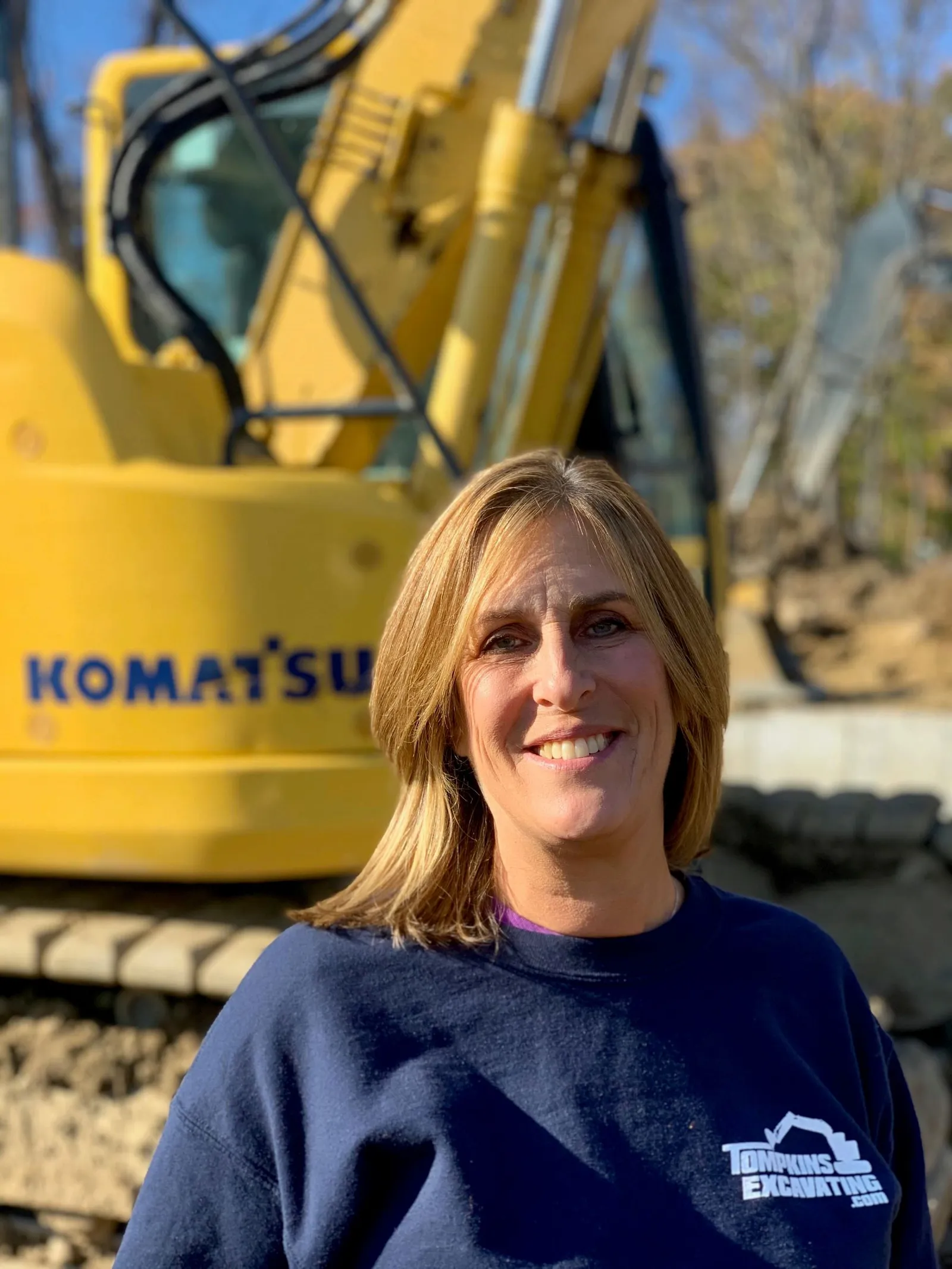This audio is automatically generated. Please let us know if you have any comments.
This article is part of a series of conversations with women leaders in the construction industry. Click here for past discussions.
Prior to transitioning into the construction industry, Stacey Tompkins worked in management as Director of Food Services for Aramark Services, overseeing corporate dining facilities for several high-profile Wall Street clients .
In 2013, she found her way into construction by entering the landscaping and landscaping business her husband started. As more jobs began to include digging, he realized there was an opportunity to take Tompkins Landscaping to the next level by transforming it into Tompkins Excavating. The Putnam Valley, New York, company now has annual revenue of $12 million.
As president, Tompkins has relied on her extensive management experience to help shape a company culture that attracts and retains top talent while emphasizing continuous learning and professional development.
Tomkins she also serves as a councilwoman in Putnam Valley, where she lives with her husband and three sons, who have played key roles in the family business. Here, Construction Dive talks to Tompkins about her company’s new designation as a Minority- and Women-Owned Business Enterprise and what it took to receive it.
This interview has been edited for brevity and clarity.
CONSTRUCTION DIVER: What made you choose construction for your career?
STACEY TOMPKINS: After spending years in a management role in a global corporation, I decided to join my husband and take the lead in implementing my vision. It was a big change, but I was drawn to the challenges and rewards of the construction industry.

Stacey Tompkins
Permission granted by Tompkins Excavating
I appreciated the tangible results of our work: seeing a project come to life from the ground up. The construction industry also offered an opportunity to break stereotypes, especially as a woman in a traditionally male-dominated field. I wanted to make my mark, not just for myself, but to pave the way for other women in the industry.
What do you do in your current job?
I oversee all aspects of our operations, from project management and client relations to team development and strategic planning. My role is to ensure that our projects align with our commitment to excellence and safety, and that we are equipped with the latest technology and training. I am deeply involved in fostering our company culture, which emphasizes teamwork and resilience, traits that have been crucial to our growth and success.
We are located in Putnam Valley in the Hudson Valley region of New York, a beautiful area that offers a mix of urban and rural projects. Our proximity to several municipalities allows us to participate in various jobs in Westchester, Putnam, Rockland and Orange counties.
You recently received New York State MWBE certification. What did it take to get it?
Achieving MWBE certification was a journey full of obstacles and resilience. It took 11 long years, during which I submitted three applications, faced denials, and underwent several appeals. The process wasn’t just about the paperwork; it was about standing up for recognition as a legitimate women-owned business in an industry where such representation is scarce.
Throughout this journey, I worked closely with legal counsel and learned a lot about the intricacies of the certification process. It was crucial to demonstrate not only our qualifications, but our commitment to diversity and inclusion in the construction industry.
This certification symbolizes not only my personal triumph, but also a step forward for women in the company, illustrating that persistence pays off.
How will it benefit your company?
While certification may not be a requirement for our continued success, I am confident that it will open up new opportunities for Tompkins Excavating. It allows us to compete for contracts reserved specifically for certified companies, which can improve our visibility in the market.
This certification not only validates our status as a woman-owned business, but also provides us with access to resources and support aimed at fostering the growth and development of minority and women-owned businesses.
In addition, the certification strengthens our brand reputation. Clients are increasingly looking for diverse collaborations, and being certified reinforces our commitment to equity and inclusion. It allows us to engage more deeply with the community, demonstrating our support for initiatives that promote diversity within the construction industry.
What are the benefits of working in construction?
The construction industry is dynamic and diverse, and offers numerous opportunities for growth. There is a constant demand for skilled labor, which means people can find a wide range of career paths, from boots on the ground in the field, such as project management, to more behind the scenes, such as engineering.
It is also a field where innovation is key; Technology is evolving rapidly and those who embrace change can lead the way. Finally, the camaraderie and relationships built on site can lead to lifelong connections, making construction a unique and rewarding career choice.
What advice would you give to young women considering construction as a career?
My advice to young women interested in a career in construction is simple: don’t be afraid to enter this space. The industry is evolving and there is a growing demand for diverse perspectives. Embrace challenges and know that your unique experiences and knowledge are valuable.
Seek mentorship and build a network of supportive peers. Surrounding yourself with others who share your ambitions can give you encouragement and guidance as you navigate your way.
Also, invest in your education and training; understanding the technical aspects of construction will allow you to excel. Finally, be persistent. The journey may be tough, but your determination can help break down barriers and create opportunities for future generations of women in construction.

